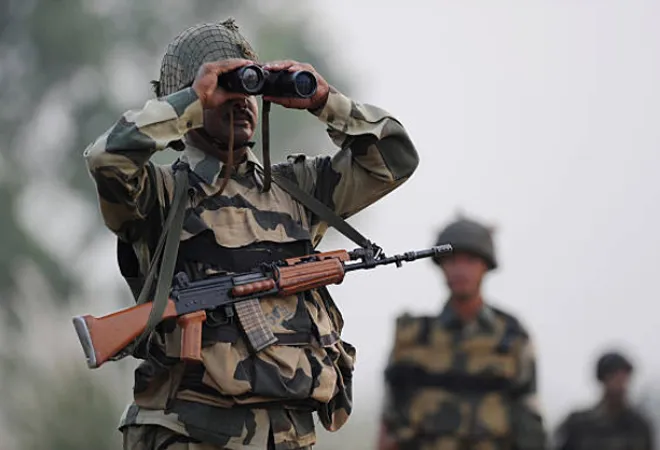
The recent decision to extend the operational jurisdiction of the Border Security Forces (BSF) in the three states that share international borders has triggered a fresh tussle between the Centre and the State in India. In the states of Assam, West Bengal, and Punjab where the BSF jurisdiction has been extended, Punjab and West Bengal are headed by non-BJP opposition parties, who have protested against this decision of the BJP-ruled Centre, accusing it to be an act of centralisation of power.
BSF’s jurisdiction of power has only been increased with regard to the authority they have under Criminal Procedure Code (CrPC), Passport (Entry into India) Act of 1920, and the Passport Act of 1967.
In a recent order released by the Union Home Ministry under the Border Security Force Act of 1968, the BSF under the Centre, which is entrusted with guarding India’s international borders, will have a jurisdiction of up to 50 kilometres inside the international borders in these three states. The powers of the BSF, which include authority to arrest and search, were limited to up to 15 kilometres in these states up until now. In the same order, BSF’s area of operation in Gujarat has been reduced from 80 kilometres from the border to 50 kilometres. However, BSF’s jurisdiction of power has only been increased with regard to the authority they have under Criminal Procedure Code (CrPC), Passport (Entry into India) Act of 1920, and the Passport Act of 1967. Their power to arrest, search, and seize under other laws like NDPS (Narcotic Drugs and Psychotropic Substances) Act, Arms Act, and Customs Act remains unchanged.
National security versus state autonomy debate
While the Punjab and West Bengal governments have accused the Centre of undermining the federal distribution of powers, the Centre defended the new order by asserting that strengthening the BSF’s capacity to protect India’s international borders from illegal encroachments and cross-border crimes “which includes checking smuggling of drugs, ammunition, busting the cattle smuggling and fake currency rackets” is necessary. The aim of the recent amendment is said to adopt a uniform approach towards the BSF’s jurisdiction in the border states of Punjab, West Bengal, Gujarat, Rajasthan, and Assam where it can now operate within 50 kilometres area from the border. The Central government sources also attributed the step to the increased instances of drones dropping weapons and drug trafficking in the border areas of Jammu and Kashmir and Punjab. It is also argued that the earlier limited jurisdiction of the BSF restricted its capacity to operate effectively in the “points of origin” in the deeper areas within these states, where the smuggling of goods and involved networks strive beyond its reach. It has been emphasised as an assurance against apprehensions of increase in police powers as this decision does not give BSF the power to investigate crimes and the suspects held will be handed over to the local authorities of the respective state governments.
The aim of the recent amendment is said to adopt a uniform approach towards the BSF’s jurisdiction in the border states of Punjab, West Bengal, Gujarat, Rajasthan, and Assam where it can now operate within 50 kilometres area from the border.
However, the concerned opposition-ruled states have legitimate suspicions about these recent changes. They suspect that the proposed move can lead to the Centre’s interference into the law and order of the states. In West Bengal, which shares international borders with Bangladesh, Bhutan, and Nepal, the revised notification will bring “nearly one-third of the state, and most parts of the geopolitically sensitive northern Bengal, under the jurisdiction of the BSF”. Punjab, which shares international border with Pakistan, “at least nine districts” of the state, in entirety or partially, will fall within the extended jurisdiction of the BSF. There have already been instances of lack of coordination between the BSF and Punjab Police along with concerns that the BSF’s increased limit might lead to greater suspicion amongst the state police due to jurisdictional and operational ambiguity. What has dismayed these states is that the Union government took these decisions without consulting them, thereby, undermining India’s federal structure. TMC invoked the Supreme Court judgment in the Naga People’s Movement of Human Rights versus Union Of India case (November 27, 1997), in which the apex court observed that the process of deployment of armed forces by the Union government cannot supplant the powers of the state and state’s cooperation is to be sought for the security forces to operate within a state. Apprehensions are made that the increased jurisdiction of BSF, without adequate safeguards, might lead to arbitrary use of their powers and result in increased human rights violations. Concerns have also been raised that the powers can be misused to frame rival leaders in false drugs and arms smuggling cases in these states.
The continuity of centralisation
Such tendencies of centralisation by the Union government, on grounds of national security, have been a continuous phenomenon cutting across political lines. During the tenure of Congress party-led UPA government at the Centre, the Border Security Force (Amendment) Bill in March 2012 was tabled in the Rajya Sabha, which sought to empower BSF with powers to search, seize, and arrest in any part of the country where it is deployed. The decision faced stiff resistance from the BJP-ruled states of the opposition camp at that time, accusing the government of highhandedness to scuttle state autonomy. Another policy regarding national security during UPA rule was the Centre’s proposal on the anti-terror security mechanism, National Counter Terrorism Centre (NCTC), which was vehemently opposed by not only the BJP-ruled states, but was also resisted by several states ruled by regional parties as an attack on the federal structure. As UPA was a coalition government without a majority of its own, it was compelled to stall both the policies due to political opposition. However, the Union government’s attempts to delve into state jurisdiction, flagging national security concerns, remains a recurring pattern both during UPA and NDA rule.
Political partisanship as major driver
The narratives of national security and state autonomy not only depend on which party is in power at the Centre but also on what dynamics the state governments and its leadership share with the Centre. Hence, stands on such issues have been more based on political partisanship than on substantive terms. The BJP leaders during the Congress rule decried such proposals of extension of Centre’s power as attacks on federalism. Similarly, the Congress leaders in the opposition camp today, especially in Punjab, are raising their voice against similar attempts of centralisation of power by the ruling BJP. The political polarisation reflects in the fact that while West Bengal and Punjab, ruled by anti-BJP opposition forces, protested against the decision whereas the BJP-ruled Assam, which also came in the ambit of the order, has welcomed the Centre’s recent notification. Interestingly, Punjab’s former CM Amarindar Singh, who was formerly from the Congress party, who now shares bitter relations with Congress, has expressed a wish to ally with the BJP, supporting the recent order though he raised apprehensions about the BSF’s role in Punjab during his stint as a Congress leader back in 2016.
The Union government’s attempts to delve into state jurisdiction, flagging national security concerns, remains a recurring pattern both during UPA and NDA rule.
The way forward
It is undeniably true that a country of India’s size and importance with multiple porous and sensitive international borders in a region as volatile as South Asia needs to be cautious about its border security. This is more crucial as cross-border terrorism and other crimes have the potential to adversely impact India’s national security concerns. But at the same time, as states in India’s federal polity are entrusted with the primary responsibility of managing the law and order within its jurisdiction, all decisions regarding the security architecture that impacts states’ domain of authority must be discussed adequately with the concerned state governments. Enhancing police capacity and facilitating grounds for greater cooperation between BSF and state police should be initiated jointly by the Centre and states. Institutional channels of federal communication, like the Inter-State Council, should be rejuvenated for much-needed dialogue and consultation between the Centre and the States, transcending compulsions of political partisanship. Only a consultative federal structure can further strengthen India’s democratic polity.
The views expressed above belong to the author(s). ORF research and analyses now available on Telegram! Click here to access our curated content — blogs, longforms and interviews.




 PREV
PREV


